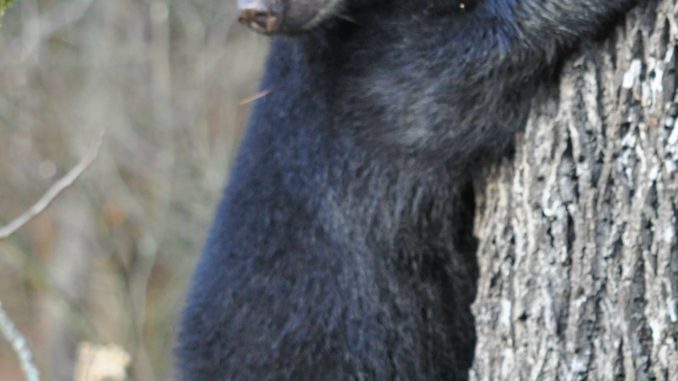
Statewide population increasing six percent annually
The N.C. Wildlife Resources Commission’s Jan. 16 Big Game Committee meeting discussing the state’s expanding bear population produced agreement among diverse user groups, according to David Cobb, director of the agency’s Wildlife Management Division, but no new proposals were adopted.
“The discussions covered a broad spectrum of ideas, all the way to leaving things the way they are now to allowing more-liberalized take of bears over bait,” Cobb said. “But we didn’t make any decisions or proposals.”
More discussions will be held, then the Commission’s Black Bear Committee will make recommendations to the Big Game Committee. Commissioners will eventually hear those proposals and send some to public hearings.
“We don’t manage for a certain number, but our management program has a goal of stabilizing the growth rate,” said Colleen Olfenbuttel, the Commission’s bear biologist, who said she is concerned about bear’s expansion into areas where they can’t be hunted and causing problems by interacting with humans.
North Carolina’s bear population currently numbers around 16,000 animals and is growing at a 6-percent annual rate.
Last fall, the Commission opened bear seasons for the first time in six counties and added to or lengthened seasons in 19 other counties because bears have expanded into new territories.
The Commission’s management of bear populations was the subject of controversy in 2007 when a statute was changed to allow hunters’ hounds to “strike” a bear’s trail near bait piles of natural foods – including corn that may have been put out by deer hunters. Before 2007, that would have been considered illegal. But hunters who targeted bears from stands objected to a perceived advantage that dog hunters had in using bait – the Commission still doesn’t allow the use of processed foods or scents to bait bear.
Last November, the Bear Committee, which Olfenbuttel chaired, met to address inequities in the baiting law.
“We came up with two options: end baiting of all game animals or allow the use of unprocessed foods by still hunters and houndsmen with one safeguard — we recommended (all bear hunters obtain) a bear tag,” she said.
Olfenbuttel said tags would allow the Commission to determine how many people hunt bears in North Carolina, a statistic the agency doesn’t have.
“After we presented these options to the Big Game Committee, houndsmen and still-hunters, we didn’t decide anything except change would have to occur,” she said. “Right now there appears to be broad support for a (special) bear tag. Most hunters like the idea.”
Seventy-one percent of hunters who harvest black bear are houndsmen, Olfenbuttel said, while 29 percent are still-hunters.
Cobb noted “everything will be on the table” when the Commission begins to make decisions about what types of bear hunting to sanction.
“We didn’t change any current allowances for hunting bears over bait,” he said, “but with a goal of stabilizing the population, (the Commission) will consider increasing the harvest through extended seasons, (perhaps) increasing the bag limit from one to two bears, even use of a second bear tag. But they’d each work differently in their impacts on bears — and it also would depend how hunters respond to changes.”
But before any changes are cemented into laws, Cobb said all ideas would be examined by Commission staff, appointed Commission members and bear hunters. “We’ll also continue to work toward solving the equity (in baiting) issue between houndsmen and still hunters,” he said.
To address any confusion about using aerosol scents to attract bears, Cobb said they’re illegal, even though the Commission’s Fishing, Hunting and Trapping Regulations Digest notes only that processed foods are illegal for baiting bears – not scents.




Be the first to comment